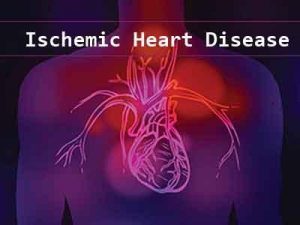- Home
- Editorial
- News
- Practice Guidelines
- Anesthesiology Guidelines
- Cancer Guidelines
- Cardiac Sciences Guidelines
- Critical Care Guidelines
- Dentistry Guidelines
- Dermatology Guidelines
- Diabetes and Endo Guidelines
- Diagnostics Guidelines
- ENT Guidelines
- Featured Practice Guidelines
- Gastroenterology Guidelines
- Geriatrics Guidelines
- Medicine Guidelines
- Nephrology Guidelines
- Neurosciences Guidelines
- Obs and Gynae Guidelines
- Ophthalmology Guidelines
- Orthopaedics Guidelines
- Paediatrics Guidelines
- Psychiatry Guidelines
- Pulmonology Guidelines
- Radiology Guidelines
- Surgery Guidelines
- Urology Guidelines
Nearly 25 percent of chronic ischemic heart disease patients dead or hospitalized in 6 months

Sophia Antipolis, 17 January 2018: Nearly a quarter of patients with chronic ischaemic cardiovascular disease are dead or hospitalized within six months, reports a European Society of Cardiology (ESC) study published in the European Journal of Preventive Cardiology.
"Coronary artery disease is the leading cause of death worldwide yet some patients appear to get lost in the system after their initial visit to a hospital or outpatient clinic," said lead author Cardiology Professor Michel Komajda, of the University Pierre and Marie Curie and Pitié-Salpêtrière Hospital in Paris, France.
The Chronic Ischaemic Cardiovascular Disease (CICD) Pilot Registry was designed to learn what happens to these patients in the six months after being seen by a health professional. The observational study was conducted as part of the EURObservational Research Programme (EORP) of the ESC.
The study included 2,420 patients from 100 hospitals and outpatient clinics in ten European countries. Participants had stable coronary disease2 or peripheral artery disease, the most common conditions seen by a cardiologist. Risk factors and treatments were recorded at the start of the study and have been previously reported.3 Treatments and outcomes were recorded at six months.
Follow-up data were available for 2,203 patients, of whom 522 (24%) had died or been rehospitalised during the six months. Factors significantly associated with the risk of dying or being rehospitalised were older age, with a hazard ratio (HR) of 1.17 for every ten years, history of peripheral revascularisation (HR 1.45), chronic kidney disease (HR 1.31) and chronic obstructive pulmonary disease (HR 1.42) (all p<0.05). The majority of the causes of death and rehospitalisation were cardiovascular.
Professor Komajda said: "These patients are at high risk of dying or being rehospitalised in the short-term and should be carefully monitored by physicians. We identified clinical factors which are strongly associated with this high risk which can easily be assessed."
The rate of prescription of angiotensin-converting enzyme inhibitors, beta-blockers (both drugs reduce blood pressure) and aspirin was lower at six months compared to the start of the study (all p<0.02).
Professor Komajda said: "In absolute numbers the reductions were modest but they did reach statistical significance. This shows that patients have a better chance of receiving recommended medications while in hospital or directly after an outpatient appointment. Six months later, drugs they should be taking to reduce the risk of death and rehospitalization are prescribed less frequently."
He added: "It is likely that there is insufficient handover of these patients to a cardiologist or GP and so their prescriptions are not renewed."
While the study did not assess the reasons for the reduction in prescriptions, possible factors include: patients getting tired of taking pills or cannot afford them.
Six month rates of death and rehospitalisation were significantly higher in eastern, western and northern European countries compared to those in the south. Given the relatively small number of patients, Professor Komajda said firm conclusions could not be drawn. But he said: "We anticipated that outcomes would be better in Mediterranean countries and this was correct, probably because of the diet and other lifestyle reasons."
Professor Komajda concluded: "The study shows that patients with chronic ischaemic cardiovascular disease have a high risk of poor short-term outcomes. Yet some are not receiving recommended preventive medications which could improve their outlook. More efforts are needed to ensure that these patients continue to be monitored and treated after they leave hospital or an outpatient appointment."
To read the full article click on the given link http://dx.doi.org/10.1177/2047487317751955

Disclaimer: This site is primarily intended for healthcare professionals. Any content/information on this website does not replace the advice of medical and/or health professionals and should not be construed as medical/diagnostic advice/endorsement or prescription. Use of this site is subject to our terms of use, privacy policy, advertisement policy. © 2020 Minerva Medical Treatment Pvt Ltd